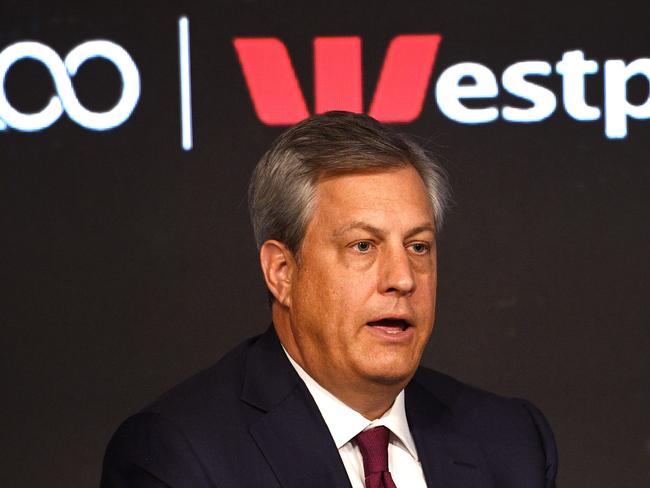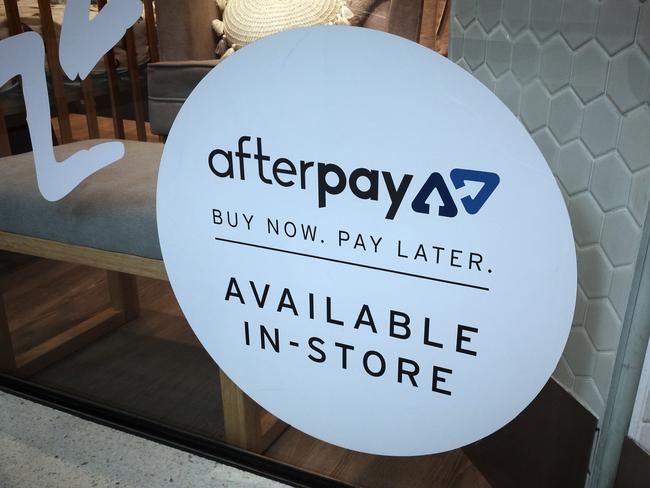Westpac child sex scandal fallout: Upheaval in store as Silicon tech giants enter the fray
Australian banks are in trouble – and not just from the latest revelations about Westpac’s appalling lack of due diligence in preventing paedophiles paying for child abuse.
NSW
Don't miss out on the headlines from NSW. Followed categories will be added to My News.
- What you get as a Daily Telegraph subscriber
- Child protection advocate calls for sacking of Westpac bosses
Is this the end of Australia’s long and largely exclusive relationship with the Big Four banks?
While Australians have long loved to bash the big financial institutions – think the 2001 drama The Bank, or Paul Keating’s move to allow foreign competition after seeing his father denied a loan to expand his business – lately the mood has become even darker.
The scandal engulfing the nation’s oldest bank, Westpac, over allegations that it enabled sickening child abuse has reignited questions about the future of the nation’s banking sector, particularly as they come so soon after the Hayne Banking Royal Commission uncovered widespread shonky practices and customer rip-offs.

The revelations also highlight the immense vulnerability of Australia’s seemingly untouchable “Big Four” banks which raked in $30 billion in profits last year – particularly as disruptive new forms of finance come out of Silicon Valley.
Westpac was caught with its pants down. Experts say it simply has not been spending the money it should on technology – as required by law – to report and catch out dodgy financial transactions such as money laundering and suspicious overseas paedophile activity.
Instead the bank has been busy issuing bumper dividends to shareholders, handing out almost $5 million in annual paychecks to chief executive Brian Hartzer and jumping on board the virtue signalling bandwagon.
It’s been happy to knock back financing the Adani Coal mine – a vital cog in lifting poor Indian villages out of poverty with electricity – under the guise of a “climate change position” and tout its $50,000 a year “Social Change Fellowship” to fund social activists. It’s also been busy campaigning on non-banking issues like the Same Sex Marriage debate, even using false suicide figures.

Yet under its very nose it was facilitating a gruesome and horrific trade.
As the financial watchdog agency Austrac put it, in its understated bureaucratic manner, about one of a dozen cases, “Had Westpac been applying appropriate detection scenarios for child exploitation typologies to Customer 1’s account, this activity would have been identified sooner.”
In other words, vile sex abuse of an innocent little kid trapped in some awful hell hole in the Philippines would have been prevented.
The excruciating details of the horror of what is occurring on the live-sex streaming videos, often on Skype, were too graphic to be said out aloud at a recent parliamentary inquiry into the problem.
But the campaigners from the world's largest global antislavery organisation, International Justice Mission, did tell the politicians that the paedophiles pay between $20 and $100 to direct the live abuse and “the more abusive the show, the more the customer pays”.
“Where an offender in Australia pays a trafficker in the Philippines to view, via webcam footage transmitted over the internet, a child engaging in sex acts with other children, adults, animals, themselves or posing in sexually explicit photos or videos,” the IJM explained. The youngest child they rescued was three months old.
Failure of diligence
Westpac, which turned in $8 billion in profits last year, failed to check on hundreds and hundreds of suspicious small payments being made to the Philippines, coming from at least a dozen customers. These live sex payment patterns differ from regular remittances sent by migrants to families back home, experts say.
The bank is expected to be hit with unprecedented fines over its role, and it remains to be seen whether it will lose some of its 13 million customers.
There’s already signs of consumer shifts towards other forms of finance, particularly to smaller style community mutual banks and a growing interest in digital offerings such as Afterpay and new options from Google, Facebook, Apple and Amazon.

Many financial experts point to the fact that Australians have tended to stick with their current bank, no matter how hopeless the service or annoying the fees, because of inertia and the inconvenience of changing. They say it will be the new generation of younger Australians who will walk with their feet.
Mutual admiration?
Others say the mutual banks, the former credit unions and building societies who merged and rebranded in the past decade – and whose profits are ploughed back into the business instead of being given out as dividends – will take on a bigger role.
Figures from comparison site Canstar show the growth in the customer-owned banks; their owner-occupied loans were up 10.56 per cent in the past year to May. That’s in comparison to the 3.75 per cent rise by the major banks.
Business Council of Co-operatives and Mutuals chief executive Melina Morrison said the recent Royal Commission revelations “revealed how the shareholder model can distract organisations from the core business of serving their customers”.
Customer Owned Banking Association chief executive Michael Lawrence argues that credit unions, mutual banks and building societies have a 150-year legacy of putting customers first.
“If consumers are sick of their current banking institution they should look beyond the big banks and turn to the customer owned model that returns profits to customers, not shareholders, and are an integral part of the community through grants, donations and supporting the many aspects of day to day life,” he said.
Choice policy adviser Patrick Veyret said the Westpac scandal showed the big banks had not changed their ways since the Hayne Royal Commission.
“The banks’ apologies ring very hollow,” he said. “It’s clear that big banks care more about chasing short term profit than looking after their customers.
“We encourage people to shop around to find a better deal. Across the entire industry – from insurance to residential mortgages – big financial institutions are overcharging existing customers and punishing them for showing loyalty.”
Generational change
Swinburne University corporate governance research fellow Helen Bird says the Commonwealth Bank’s own poor behaviour from a few years ago in failing to track money laundering and counter-terrorism funding did not appear to have triggered major customers losses – but Westpac’s scandal is worse.
“Because it involves children, allowing horrendous crimes to be committed, it’s that much worse, people will relate to that,” she said.
“But in the bigger picture, the people most likely to be affected and look around and go to a different kind of bank are the younger people commencing their banking lives.
“People are looking more critically at those smaller institutes now. What has happened until now is that the four big banks have been the big predominant players because they have an oligopoly.
“What I suspect will happen is that the Millennials, or younger people, are going to look around and say to themselves I can go to a smaller bank, a mutual, a member bank and get a much better deal. Or I’ll move to a different kind of facility altogether. “
Generation Z, born between 1995 and 2009 are numerically the largest generation ever, comprising around 20 per cent of Australia’s population.
A number of forecasters predict this tech-savvy generation will display far less loyalty and flock to any new banking entrant who offers seamless services.
Ms Bird says that part of the success of the big banks in Australia has been their legacy, and a system that has favoured them, but there is a shift underway.
“We’re entering a different level of sophistication when the big global corporates from Silicon Valley become involved,” she says.
KPMG analysts agree. Their recent examination of what banking will look like by 2030 – only 10 years away – predicts that “over the next decade we will see more changes in the banking industry than we have witness in the past 100 years.”
They found that among Australians aged between 18 and 30, 84 per cent would consider banking with one of the tech giants like Amazon, Google and Facebook.
The entry of these behemoths into the market is likely to cause massive structural change on a scale never seen before.
Facebook is making its own digital currency – which could be used on WhatsApp – and with predictions this could lead it become the biggest bank in the world. Amazon is expanding into consumer banking and Apple is set to take over credit cards and loans. As one financial paper put it, “Silicon Valley is eating the bank’s lunch.”
Equity analyst Ryan Dinse predicts Australia’s “cosy banking monopoly” is “about to end”.
Small start-ups like the Australian companies like Afterpay have already become very popular in an extraordinary short amount of time.
The financial technology payment system has managed to reinvent lay-bys for Generation Z. It offers a simple online way of buying something you can’t immediately afford by splitting the payments into four instalments, interest free. You don’t need to own a credit card and was only launched in 2015 yet now it processes more than 10 per cent of all physical online retailing in Australia.
It remains to be seen whether Westpac, originally the nation’s first bank as the Bank of NSW in 1817, will learn from its current scandal and reinvest in technology, particularly as it battles with the tech giants in the coming bank wars.

